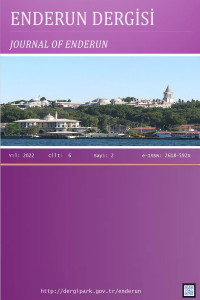Öz
Today, for most people, the main factor behind product preference is not only the benefit obtained from the product. Consumers do not buy products just to get rational benefits. In addition, they buy products to gain social approval, to be appreciated by others and to show their social status. Social and psychological factors are also determinant in the product preference of consumers. One of these factors is materialism. For materialist consumers, the determinant of happiness is material assets and its quantity. In addition, the spending tendency of each consumer may be different. Therefore, the tendency of spend is also effective on the product preferences of consumers. In this study, the effects of social status, materialism and spending tendencies on conspicuous consumption will be examined. In addition, the mediating role of spending tendency in the effect of social status and materialism on conspicuous consumption will be examined. The population of the research consists of consumers living in Turkey. The sample of the research consists of 316 people selected from this population. Data were obtained from this sample through a questionnaire. The data obtained as a result of the research were analyzed in the AMOS program and the results were interpreted. The results obtained in the research are as follows; social status and materialism have a positive effect on tendency to spend and conspicuous consumption; The tendency to spend has a positive effect on conspicuous consumption. The mediation effect of the tendency to spend could not be determined.
Anahtar Kelimeler
Social Status Materialism Tendency of Spending Conspicuous Consumption
Kaynakça
- Baron, R. M. & Kenny, D. A. (1986). The Moderator–Mediator Variable Distinction in Social Psychological Research: Conceptual, Strategic, and Statistical Considerations. Journal of Personality and Social Psychology, 51(6), s. 1173-1182.
- Chang, L. & Arkin, R. (2002). Materialism as An Attempt to Cope With Uncertainty. Psychology and Marketing, 19, s. 389-406.
- Fah, B. C. Y., Foon, Y. S. & Osman, S. (2011). An Exploratory Study of The Relationships Between Advertising Appeals, Spending Tendency, Perceived Social Status And Materialism on Perfume Purchasing Behavior. International Journal of Business and Social Science, 2(10), s. 202-208.
- Kasser, (2002). The High Price of Materialism. MIT Press: Massachusetts.
- O’cass, A. & Mcewen, H. (2005). Exploring Consumer Status and Conspicuous Consumption. Journal of Consumer Behaviour, 4(1), s. 25-39.
- Podoshen, J. S., Li, L. & Zhang, J. (2011). Materialism and Conspicuous Consumption in China: A Cross-cultural Examination. International Journal of Consumer Studies, 35, s. 17-25.
- Richins, M.L. & Dawson, S. (1992). A Consumer Values Orientation for Materialism and Its Measurement: Scale Development and Validation. Journal of Consumer Research, 19(3), s. 303-316.
- Sesli, M. & Demir, Ş. (2010). Türk Siyasi Elitlerin Toplumsal Kökeni (1920–1950). Akademik Bakış Dergisi, 21, s. 1-30.
- Tokmak, G. (2019). Materyalist Eğilim ve Tüketici Ahlakının Gösterişçi Tüketim Eğilimi Üzerindeki Etkisi. IBAD Sosyal Bilimler Dergisi, (5), s. 359-378.
- Topçu, U. C., Eroğlu, U. & Özer, A. (2020). Gösterişçi Tüketimin Kökenleri: Benlik, Sosyal Statü ve Tüketici Materyalizmi. Tüketici ve Tüketim Araştırmaları Dergisi, 12(1), s. 151-185.
Öz
Günümüzde çoğu insan için ürün tercihinin arkasındaki ana faktör sadece üründen elde edilen fayda değildir. Tüketiciler ürünleri sadece rasyonel faydalar elde etmek için satın almazlar. Ayrıca sosyal onay kazanmak, başkaları tarafından takdir edilmek ve sosyal statülerini göstermek için ürün satın alırlar. Tüketicilerin ürün tercihinde sosyal ve psikolojik faktörler de belirleyicidir. Bu faktörlerden biri de materyalizmdir. Materyalist tüketiciler için mutluluğun belirleyicisi maddi varlıklar ve bunların miktarıdır. Ayrıca her tüketicinin harcama eğilimi farklı olabilir. Dolayısıyla harcama eğilimi tüketicilerin ürün tercihleri üzerinde de etkilidir. Bu çalışmada sosyal statü, materyalizm ve harcama eğiliminin gösterişçi tüketim üzerindeki etkileri incelenmektedir. Ayrıca sosyal statü ve materyalizmin gösterişçi tüketim üzerindeki etkisinde harcama eğiliminin aracı rolü incelenmektedir. Araştırmanın evrenini Türkiye'de yaşayan tüketiciler oluşturmaktadır. Araştırmanın örneklemi ise bu evren içerisinden seçilen 316 kişiden oluşmaktadır. Bu örneklemden anket aracılığıyla veri elde edilmiştir. Araştırma sonucunda elde edilen veriler AMOS programında analiz edilerek, sonuçlar yorumlanmıştır. Araştırmada elde edilen sonuçlar şunlardır; sosyal statü ve materyalizmin harcama eğilimi ve gösterişçi tüketim üzerinde pozitif etkisi vardır; harcama eğiliminin gösterişçi tüketim üzerinde pozitif etkisi vardır. Harcama eğiliminin aracılık etkisi ise tespit edilememiştir.
Anahtar Kelimeler
Kaynakça
- Baron, R. M. & Kenny, D. A. (1986). The Moderator–Mediator Variable Distinction in Social Psychological Research: Conceptual, Strategic, and Statistical Considerations. Journal of Personality and Social Psychology, 51(6), s. 1173-1182.
- Chang, L. & Arkin, R. (2002). Materialism as An Attempt to Cope With Uncertainty. Psychology and Marketing, 19, s. 389-406.
- Fah, B. C. Y., Foon, Y. S. & Osman, S. (2011). An Exploratory Study of The Relationships Between Advertising Appeals, Spending Tendency, Perceived Social Status And Materialism on Perfume Purchasing Behavior. International Journal of Business and Social Science, 2(10), s. 202-208.
- Kasser, (2002). The High Price of Materialism. MIT Press: Massachusetts.
- O’cass, A. & Mcewen, H. (2005). Exploring Consumer Status and Conspicuous Consumption. Journal of Consumer Behaviour, 4(1), s. 25-39.
- Podoshen, J. S., Li, L. & Zhang, J. (2011). Materialism and Conspicuous Consumption in China: A Cross-cultural Examination. International Journal of Consumer Studies, 35, s. 17-25.
- Richins, M.L. & Dawson, S. (1992). A Consumer Values Orientation for Materialism and Its Measurement: Scale Development and Validation. Journal of Consumer Research, 19(3), s. 303-316.
- Sesli, M. & Demir, Ş. (2010). Türk Siyasi Elitlerin Toplumsal Kökeni (1920–1950). Akademik Bakış Dergisi, 21, s. 1-30.
- Tokmak, G. (2019). Materyalist Eğilim ve Tüketici Ahlakının Gösterişçi Tüketim Eğilimi Üzerindeki Etkisi. IBAD Sosyal Bilimler Dergisi, (5), s. 359-378.
- Topçu, U. C., Eroğlu, U. & Özer, A. (2020). Gösterişçi Tüketimin Kökenleri: Benlik, Sosyal Statü ve Tüketici Materyalizmi. Tüketici ve Tüketim Araştırmaları Dergisi, 12(1), s. 151-185.
Ayrıntılar
| Birincil Dil | İngilizce |
|---|---|
| Bölüm | Makaleler |
| Yazarlar | |
| Yayımlanma Tarihi | 7 Ekim 2022 |
| Kabul Tarihi | 25 Ağustos 2022 |
| Yayımlandığı Sayı | Yıl 2022 Cilt: 6 Sayı: 2 |


